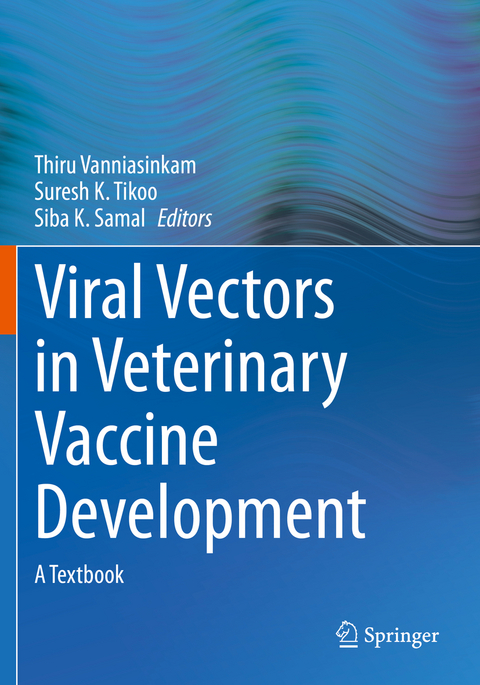
Viral Vectors in Veterinary Vaccine Development
Springer International Publishing (Verlag)
978-3-030-51929-2 (ISBN)
This highly accessible textbook introduces readers to the development of viral vectors and discusses their application in veterinary vaccinology. It offers comprehensive information on the latest advances in this emerging research field, together with a broad overview of the history of veterinary vaccines and viral vectors. The book also addresses issues concerning funding, translational research and ethics that will impact the future development, manufacture and global use of viral vector-based veterinary vaccines.
The book addresses the needs of graduate students and researchers in the fields of Veterinary Medicine, Virology and Immunology.
Dr. Vanniasinkam holds a BSc from Flinders University, Australia, and an Applied Science/Graduate Diploma (Honours) in Medical Laboratory Science and PhD in Microbiology/Immunology from the University of South Australia. She is a fellow of the Australian Society for Microbiology (ASM), secretary of the ASM Education Special Interest Group and committee member of the ASM New South Wales branch. She is a member of the American Society for Microbiology and is a Microbiology Society (UK) Champion. She is Head of the Medical Science Discipline, School of Biomedical Sciences, Charles Sturt University, Australia and her research interests include viral vectors, vaccinology and epidemiology of equine and poultry pathogens. Prof. Suresh K. Tikoo received his BVSc & AH and MVSc from Govind Ballabh Pant, University of Agriculture & technology, India, and his PhD from the University of Saskatchewan, Canada. He is a fellow of the National Academy of Veterinary Sciences, India. He has served as Head of the Viral Vectored program at VIDO-InterVaC and Interim Executive Director of the School of Public Health, University of Saskatchewan. Currently, he is a Processor and Director of the Vaccinology & Immunotherapeutics Graduate program at the School of Public Health, and a Research Fellow at VIDO-InterVac, University of Saskatchewan. His research interests include molecular virology, viral vectors, DNA viruses, vaccinology, mucosal immunization and virus-host interactions. Dr. Siba K. Samal received his BVSc & AH from Orissa University of Agriculture and Technology, India, MVSc from the Indian Veterinary Research Institute and MS PhD from Texas A&M University. He was a post-doctoral fellow at Baylor College of Medicine and at Plum Island Animal Disease Research Center. He is a diplomate of the American College of Veterinary Microbiologists and a fellow of the American Academy of Microbiology and the National Academy of Veterinary Science, India. He is currently a Professor at the University of Maryland and is former Chair and Associate Dean of Virginia-Maryland College of Veterinary Medicine. His research focuses on the molecular biology of paramyxoviruses, viral pathogenesis and development of paramyxoviruses as vaccine vectors.
Chapter 1. Introduction to Veterinary Vaccines.- Chapter 2. "What is Required to Develop a Viral Vector Vaccine: Key Components of Vaccine-Induced Immune Responses".- Chapter 3. Viruses and the evolution of viral vectors.- Chapter 4. The role of adjuvants in the application of viral vector vaccines.- Chapter 5. Adenovirus Vectors.- Chapter 6. Poxvirus Vectors.- Chapter 7. The Construction and Evaluation of Herpesvirus Vectors.- Chapter 8. Paramyxoviruses as Vaccine Vectors.- Chapter 9. Rhabdoviruses as vaccine vectors for veterinary pathogens.- Chapter 10. Coronaviruses as Vaccine Vector for Veterinary Pathogens.- Chapter 11. Alphavirus-Based Vaccines.- Chapter 12. Manufacturing and Control of Viral Vectored Vaccines: Challenges.- Chapter 13. Regulatory strategies and factors affecting veterinary viral vector development.- Chapter 14. "Emerging Viral Vectored Technology Future potential of capripoxvirus and African swine fever virus as viral vectors".
| Erscheinungsdatum | 03.12.2021 |
|---|---|
| Zusatzinfo | XI, 230 p. 35 illus., 22 illus. in color. |
| Verlagsort | Cham |
| Sprache | englisch |
| Maße | 178 x 254 mm |
| Gewicht | 463 g |
| Themenwelt | Medizin / Pharmazie ► Medizinische Fachgebiete ► Mikrobiologie / Infektologie / Reisemedizin |
| Medizin / Pharmazie ► Medizinische Fachgebiete ► Pharmakologie / Pharmakotherapie | |
| Medizin / Pharmazie ► Pharmazie | |
| Studium ► Querschnittsbereiche ► Infektiologie / Immunologie | |
| Naturwissenschaften ► Biologie ► Mikrobiologie / Immunologie | |
| Veterinärmedizin ► Klinische Fächer ► Parasitologie | |
| Schlagworte | basic textbook veterinary • large animal vaccine • Vaccination • vaccines • Vector Design • veterinary virology |
| ISBN-10 | 3-030-51929-5 / 3030519295 |
| ISBN-13 | 978-3-030-51929-2 / 9783030519292 |
| Zustand | Neuware |
| Informationen gemäß Produktsicherheitsverordnung (GPSR) | |
| Haben Sie eine Frage zum Produkt? |
aus dem Bereich


